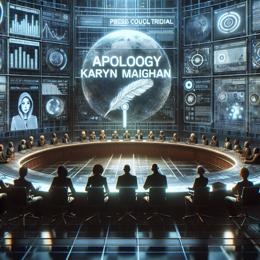Image created by AI
Press Ombud Rules against City Press for Omitting Key Facts in Allegations against Judge Rusi
The Press Ombud in South Africa has issued a ruling against the news publication City Press for failing to present a fair account of events surrounding Judge Lindiwe Rusi of the Eastern Cape Division of the High Court. The ruling highlighted a breach of the Press Code, specifically regarding the preservation of individual dignity and reputation in journalism.
This controversy traces back to the conduct of Judge Rusi during an ongoing investigation into a sexual harassment complaint against the High Court's Judge President (JP), currently on special leave. Row Hartle, the journalist in question, accused Judge Rusi in December 2022, of intruding into this formal judiciary process by contacting the complainant inappropriately – a narrative Hartle repeated in a subsequent City Press article in March 2024.
However, this accusation overlooked a fundamental detail – after criticism of Hartle's initial allegations, published in the Sunday Times in March 2023, a follow-up piece included a version of events provided by Judge Rusi. An essential piece of reportage, this served as her rebuttal to the allegations, a fact that Hartle failed to include in his later City Press article.
The omission of Judge Rusi's explanation casts Hartle's representation of the event in a problematic light. By not including her denial and version of the call, Hartle deprived readers of the opportunity to consider a complete set of facts. In the realm of journalism, where the accuracy is paramount, omitting such information can significantly impact the subjects' reputation and the reader's understanding.
The Press Ombud's ruling emphasized the absence of malice in Hartle's reporting, acknowledging that the journalist did tackle matters of public interest. Nevertheless, by not considering all material facts, Hartle and City Press failed to meet the Press Code's requirements for a fair comment defense.
The implications of the ruling are profound. City Press is required to not only apologize for the omission and the consequent damage to Judge Rusi's reputation but also to update the online version of the article to include the missing information. Importantly, this update, along with the wording of the apology, must receive approval from the Press Ombud before publication.
The case underscores the ethical responsibilities of media outlets and journalists in their reporting, especially when the reputation of individuals is at stake. In matters of such sensitivity, the full spectrum of information must make it to the public domain to uphold the standards of journalistic integrity and fairness.










